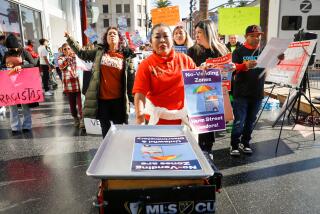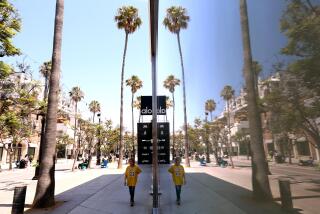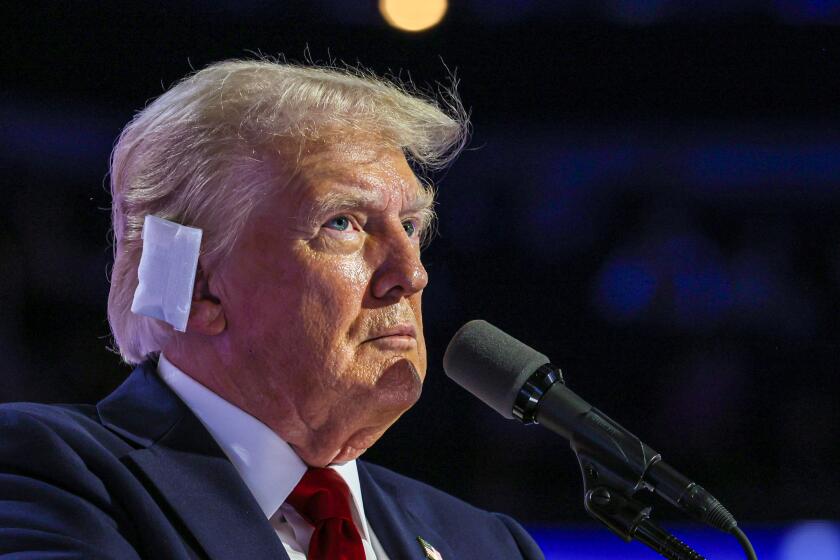Opinion: Here’s how we get a real deal on street vending
When my father, Al Langer, founded Langer’s Delicatessen and Restaurant in 1947, on a corner overlooking MacArthur Park, it was a tiny establishment with just 12 seats. In the decades since, we’ve grown into a 135-seat Los Angeles culinary landmark. We’ve received accolades from quarters as diverse as the James Beard Foundation and Hollywood director Nora Ephron.
We’ve had our struggles too -- the urban blight of gangs and drugs in the 1990s and the Great Recession of the 2000s -- but we survived. Today, we face a new challenge that threatens our future: unlicensed street vending.
Business is down by 23% over the last year. I believe the reason is largely because unlicensed street vendors selling used clothing, food, DVDs and more have set up shop outside our doors. They display their wares on blankets spread across the sidewalk, perched atop boxes and tables and transported in shopping carts of dubious provenance. They block portions of the sidewalk leading to Langer’s from the nearest subway station and our parking lot two blocks away.
It’s a gantlet and an unsightly mess, and it’s driving off customers from a business that is the type of employer the city says it wants.
It’s a gantlet and an unsightly mess, and it’s driving off customers from a business that is the type of employer the city says it wants. We have 40 employees receiving union wages and full benefits, including healthcare. Yet our livelihood and the livelihoods of our employees and their families are at risk.
Street vendors are currently calling for unlimited citywide vending, which would mean they could operate virtually whenever and wherever they choose. There are an estimated 50,000 street vendors in L.A. Compare that with New York City, which has fewer than 6,000 licensed vendors.
We are working with Councilman Gil Cedillo to develop an alternative plan -- a zone near MacArthur Park where street vendors can sell their goods without blocking sidewalks and entrances to brick-and-mortar businesses. We are in the early stages of this experiment, but it is showing some promise and may provide a model for a future citywide ordinance. However, the key to this experiment -- and to any street-vending regulations -- is effective and fully funded enforcement.
Though the law allows for the creation of vending zones, ours is the first effort to create one since the early 2000s -- also in MacArthur Park. That effort failed because enforcement was almost nonexistent. Unlicensed vendors sold their products with little fear of being ticketed or shut down, undercutting the permitted vendors. The district, not surprisingly, shut down in 2004.
I observe the power of robust enforcement on a daily basis. Street vendors don’t set up in the area outside the Westlake/MacArthur Park subway station because the MTA closely polices the property under its jurisdiction. Just beyond the MTA property, however, unlicensed street vendors line the sidewalk because no one enforces the law there.
Brick-and mortar-businesses across Los Angeles are seeking a solution to illegal street vending. Though we don’t have all the answers, we do know that while many city and county departments have their hands in the issue, no one has taken accountability for enforcing the law. The police are often the first to respond to complaints, but they obviously have higher priorities.
Creating or assigning one department to oversee all vending issues and to coordinate all city and county efforts to oversee vending regulations, permitting and enforcement would help address the lack of accountability and enforcement. Whichever agency takes the helm on this issue must be able to enforce the law 24/7, because unlicensed street vending often takes place on the weekends and late at night. This agency must also have the authority to issue tickets and shut down unlicensed street vendors.
The city, meanwhile, needs to create a schedule of escalating fines and penalties for unpermitted vending, including a one-year suspension of permits. Setting fees and fines high enough to cover the cost of enforcement is critical.
Most important, all vendors must operate in the vending zones because it’s impossible to police vending activities across the more than 450 square miles of Los Angeles.
Effective enforcement of whatever regulations the City Council adopts is essential to ensuring the future of the brick-and-mortar businesses such as ours, as well as street vendors who follow the rules. Without enforcement, regulation of street vending will have no more meaning than it does today.
Norm Langer is the owner of Langer’s Delicatessen and Restaurant.
Follow the Opinion section on Twitter @latimesopinion and Facebook
More to Read
A cure for the common opinion
Get thought-provoking perspectives with our weekly newsletter.
You may occasionally receive promotional content from the Los Angeles Times.






